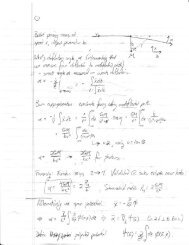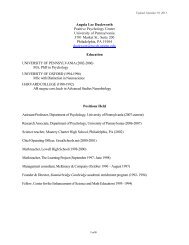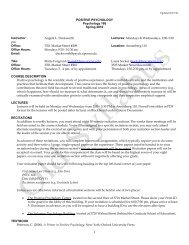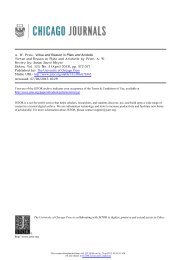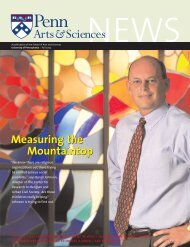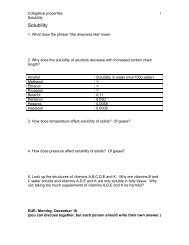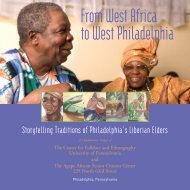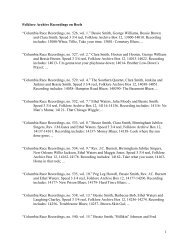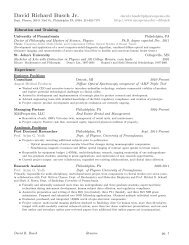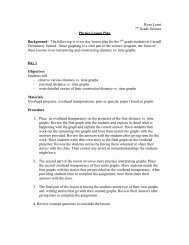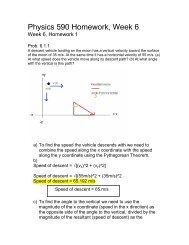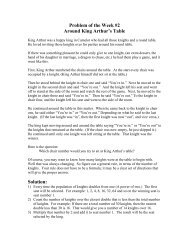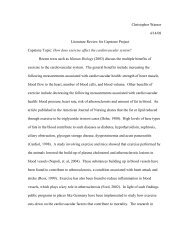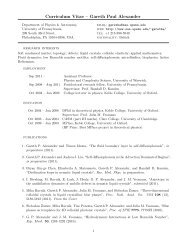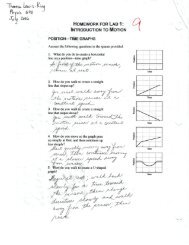PENN SUMMER - University of Pennsylvania
PENN SUMMER - University of Pennsylvania
PENN SUMMER - University of Pennsylvania
You also want an ePaper? Increase the reach of your titles
YUMPU automatically turns print PDFs into web optimized ePapers that Google loves.
PhIl 072 910 MTWr 10:30am–12:05pm staff<br />
Biomedical Ethics<br />
Fulfills Society Sector<br />
A survey <strong>of</strong> moral problems in medicine and biomedical research.<br />
Problems discussed include: genetic manipulation, informed consent,<br />
infanticide, abortion, euthanasia, and the allocation <strong>of</strong> medical<br />
resources. Moral theory is presented with the aim <strong>of</strong> enabling<br />
students to think critically and analytically about moral issues. The<br />
need for setting biomedical issues in broader humanistic perspective<br />
is stressed.<br />
PhIl 225 910 MTWr 3:00pm–4:35pm akhundov<br />
Philosophy <strong>of</strong> Science<br />
Crosslisted with: COML 224 910<br />
An introductory course in history and philosophy <strong>of</strong> science focused<br />
on the development <strong>of</strong> the modern scientific view <strong>of</strong> the world.<br />
Starting with ancient Greek science and philosophy, the course surveys<br />
the history <strong>of</strong> physics, astronomy and cosmology, examining the<br />
origin <strong>of</strong> concepts such as substance, cosmos, atom, space, time, evolution,<br />
and law <strong>of</strong> nature. The course also covers key issues in the<br />
Philosophy <strong>of</strong> Science, including the relationship between induction<br />
and deduction, analysis and synthesis, theory and evidence, the nature<br />
<strong>of</strong> scientific explanation. Readings will be drawn from the writings<br />
<strong>of</strong> Aristotle, Copernicus, Descartes, Newton, and Einstein, as<br />
well as secondary sources.<br />
PhiloSoPhY, PoliTiCS, eConoMiCS<br />
PPe 110 910 Tr 6:00pm–9:10pm sen<br />
Introduction to Decision Theory<br />
Fulfills Formal Reasoning Course<br />
This course will provide an introduction to models <strong>of</strong> human decision<br />
making. One <strong>of</strong> the primary purposes <strong>of</strong> the course is to provide<br />
a set <strong>of</strong> basic tools that will help the student translate uncertainty<br />
into numbers. Rational choice under uncertainty is by far the most<br />
used theory <strong>of</strong> decision making, and its applications are widespread<br />
in economics, finance, political science, law, managerial decision<br />
making, the economics <strong>of</strong> health care, and artificial intelligence. The<br />
course will use examples from each <strong>of</strong> these fields (and also fun “paradoxes”<br />
such as the Monty Hall Puzzle) in providing an introduction<br />
to the basic foundations <strong>of</strong> decision making. We will also look at the<br />
shortcomings <strong>of</strong> the rational choice theory: both from intuitive and<br />
empirical perspectives. No mathematical prerequisites are necessary<br />
beyond high school algebra and arithmetic.<br />
PhYSiCS*<br />
PhYs 101 910 MTWrF 10:00am–12:45pm heiney<br />
General Physics: Mechanics, Heat, and Sound<br />
Fulfills Physical World Sector, Quantitative Data Analysis Requirement /<br />
Prerequisite(s): Entrance credit in algebra and trigonometry, and a background<br />
in calculus. / Co-requisite(s): PHYS 101 LAB / Credit is awarded for only<br />
one <strong>of</strong> This courses: PHYS 101, PHYS 150, or PHYS 170. Students with AP or<br />
Transfer Credit for PHYS 91 or PHYS 93 who complete PHYS 101 will thereby<br />
surrender the AP or Transfer Credit.<br />
An introduction to the classical laws <strong>of</strong> motion requiring a background<br />
in calculus. Suggested for students in a pre-health program.<br />
*Limited space Available<br />
lAb SectionS:<br />
PHYs 101 911 MW 1:30pm–4:00pm staff<br />
PHYs 101 912 MW 1:30pm–4:00pm staff<br />
PHYs 101 913 Tr 1:30pm–4:00pm staff<br />
PHYs 101 915 TbA staff<br />
PoliTiCal SCienCe<br />
PsCI 130 910 MTWr 10:30am–12:15pm doherty-sil<br />
Introduction to American Politics<br />
Fulfills Society Sector<br />
This course is intended to introduce students to the national institutions<br />
and political processes <strong>of</strong> American government. What are the<br />
historical and philosophical foundations <strong>of</strong> the American Republic?<br />
How does American public policy get made, who makes it, and who<br />
benefits? Is a constitutional fabric woven in 1787 good enough for<br />
today? How, if at all, should American government be changed, and<br />
why? What is politics and why bother to study it? If these sorts <strong>of</strong><br />
questions interest you, then this course will be a congenial home. It is<br />
designed to explore such questions while teaching students the basics<br />
<strong>of</strong> American politics and government.<br />
PsCI 139 910 Tr 1:00pm–4:10pm Funke<br />
Perspectives on Urban Poverty<br />
This course will explore the causes and consequences <strong>of</strong> inequality<br />
in the United States and beyond. We will use interdisciplinary tools<br />
and a variety <strong>of</strong> lenses to examine changing experiences and understandings<br />
<strong>of</strong> poverty. The course begins with social history, to trace<br />
the different forms that poverty has taken, the connections between<br />
poverty and the economy writ large, and the shifting ideologies that<br />
have explained and distorted what it means to be poor The course is<br />
primarily concerned with the ways in which historical, cultural, political,<br />
racial, social, spatial/geographical, and economic forces have<br />
either shaped or been left out <strong>of</strong> contemporary debates on urban<br />
poverty. We will critically analyze a wide body <strong>of</strong> literature seeking<br />
to theorize urban poverty. Primacy will be granted to critical analysis<br />
<strong>of</strong> course readings, particularly with regard to the ways in which various<br />
knowledge systems—or regimes <strong>of</strong> truth—create, sustain, and<br />
constrict meaning in reference to urban poverty.<br />
PsCI 181 910 Tr 1:00pm–4:30pm Kennedy<br />
Modern Political Thought<br />
Fulfills History & Tradition Sector<br />
This course surveys themes and concepts in modern thought about<br />
politics. Among the topics covered are rights, sovereignty, law, and<br />
war. Theorists will include Machiavelli, Hobbes, Locke, Rousseau,<br />
and Marx. This is an introductory course. It fulfills a core requirement<br />
for the Political Science and PPE majors.<br />
<strong>SUMMER</strong> SESSIOn I • MAY 24–JULY 2, 2010 23



